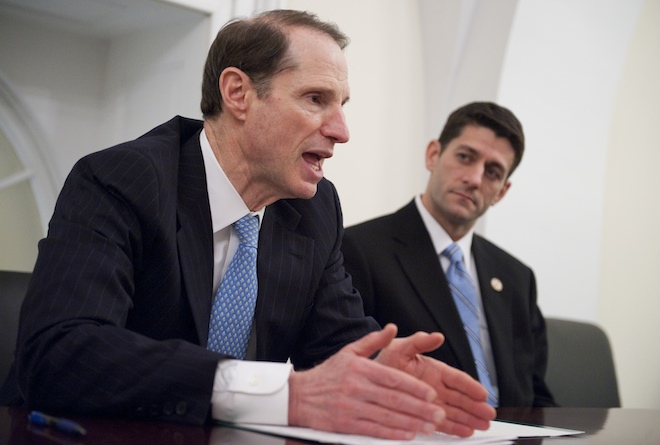Sen. Ron Wyden wants to assure his colleagues he hasn’t undermined them politically. In a head-turning move, Wyden announced Wednesday that he’s teamed up with House GOP budget chair Paul Ryan on a policy framework to partially privatize Medicare — a move that stunned his fellow Democrats.
Setting aside the policy — which would in essence turn Medicare into ObamaCare with a robust public option — the very existence of the plan has deep implications for the 2012 elections, most of them bad for his own party.
Speaking to reporters Thursday after an event with Ryan, Wyden said the political ramifications are overblown.
“Nobody ducks their past votes and their previous statements,” Wyden said. “That’s just a given.”
What he’s alluding to here is the concern that, by teaming up with Ryan, he’s giving GOP candidates in 2012 — and particularly the GOP presidential nominee — cover from charges that they support overhauling Medicare in radical, conservative ways. This attack has dogged the entire Republican party since GOP members of Congress voted en masse for Ryan’s budget, which proposed phasing out traditional Medicare altogether, earlier this year. Wyden says those fears are overblown.
“That is sure to be part of the politics of 2012 on both sides of the aisle,” he said.
But the reaction from Democrats — both nameless, and on the record, has been severe.
Two White House spokesmen — Jay Carney and Dan Pfeiffer — rejected the plan outright. Carney claimed the plan would “end Medicare as we know it.”
Leaving Wyden’s name out of it, House Minority Leader Nancy Pelosi said, “[Paul] Ryan’s latest Medicare plan is another example of GOP’s desire for Medicare, as Gingrich described, to “wither on the vine.”
Rep. Pete Stark (D-CA) — a top Dem on health care issues — lashed out: “despite Wyden’s claims otherwise, the Wyden-Ryan plan ends Medicare as we know it, plain and simple.”
And so on.
Compare that to the fairly warm response Ryan’s received from leading members of his own party.
House Speaker John Boehner called it “a bipartisan idea that’s worthy of our consideration…a step in the right direction.”
“The Wyden-Ryan bipartisan Medicare reform plan is a major breakthrough with Democrats and Republicans working together to solve big problems,” tweeted Newt Gingrich, who has criticized his GOP primary rival Mitt Romney for proposing a plan very similar to Wyden-Ryan. “Ron Wyden and Paul Ryan deserve credit for having the courage to work across party lines on a very difficult large challenge.”
There are a few reasons for the differing degrees of backlash. First, the political consequences of the Wyden-Ryan alliance are worse for Democrats than for Republicans. As noted above, it gives Romney or Gingrich some cover when the Obama campaign attacks them for wanting to end Medicare (“one of the most liberal members of your party supports my plan,” goes the imagined retort). And more broadly, it complicates the Democratic party’s heretofore unanimous opposition to all plans that involve partial or total privatization of the program.
Still, it’s easy to overstate the impact of all this. One keyed in Democratic strategist reminds Dems that Wyden and Ryan working together doesn’t change the narrative or the events that have transpired this year. “Do you think that Democrats got a lot of cover for their vote on the health care bill because one Republican, Joseph Cao, supported it?” (Cao, who was defeated in 2010, voted for the House version of the health care bill, but against the final legislation.)
Indeed, this strategist points out that by tacitly acknowledging his own budget plan went too far for bipartisan support, Ryan has essentially hung his colleagues out to dry — conceding to Dems that traditional, fee for service Medicare isn’t going away any time soon.
But even if this only helps Republicans at the margin, there’s still the question of what Wyden (or Democrats or liberals) get out of this arrangement.
Outlined in greater detail here, the plan does two big things. First, it moots one of the key elements of President Obama’s health care law, which empowered a new panel — the Independent Payment Advisory Board — to hold Medicare cost growth down to a rate of GDP growth plus one percent. Instead, it calls on Congress to act as rationer-in-chief, and, if Congress fails, it imposes across-the-board premium hikes on beneficiaries in order to achieve the same GDP-plus-one growth target.
That’s how it holds down the deficit. And swapping out IPAB in order to re-empower Congress is an idea that could have bipartisan support on Capitol Hill.
Completely separately from that, it proposes turning Medicare from a single-payer government insurer into a market place where private plans can compete with the traditional government Medicare program. That is, it gives seniors a version of ObamaCare, with a Medicare as a public option. This idea has no public bipartisan support, if you don’t count Wyden, and is the key reason Democrats are so unhappy with the plan. Setting aside publicly stated concerns about the risk it poses to the Medicare guarantee, there’s little evidence that competition among insurers will contain health care costs in and of itself. And indeed, by diluting Medicare’s enormous purchasing power, it could actually weaken the program’s cost containment advantage.
Ryan’s not completely off the hook with conservatives, who view his decision to include traditional Medicare in the plan as a pre-emptive concession to liberals. But they also recognize that this plan ends the single-payer, government-dominated nature of Medicare — and that’s a generational cause for them. If you think of liberals and conservatives as engaged in a tug of war over the health care system, pulling in opposite directions, the Wyden-Ryan plan would lurch things to the right. That’s why Ryan’s getting more of a pass.






